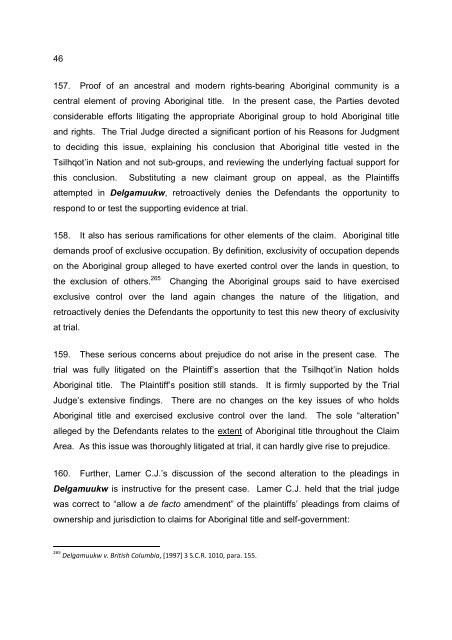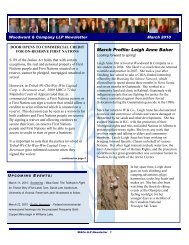46157. Proof of an ancestral and modern rights-bearing Aboriginal community is acentral element of proving Aboriginal title. In the present case, the Parties devotedconsiderable efforts litigating the appropriate Aboriginal group to hold Aboriginal titleand rights. The Trial Judge directed a significant portion of his Reasons for Judgmentto deciding this issue, explaining his conclusion that Aboriginal title vested in theTsilhqot’in Nation and not sub-groups, and reviewing the underlying factual support forthis conclusion. Substituting a new claimant group on appeal, as the Plaintiffsattempted in Delgamuukw, retroactively denies the Defendants the opportunity torespond to or test the supporting evidence at trial.158. It also has serious ramifications for other elements of the claim. Aboriginal titledemands proof of exclusive occupation. By definition, exclusivity of occupation dependson the Aboriginal group alleged to have exerted control over the lands in question, tothe exclusion of others. 265 Changing the Aboriginal groups said to have exercisedexclusive control over the land again changes the nature of the litigation, andretroactively denies the Defendants the opportunity to test this new theory of exclusivityat trial.159. These serious concerns about prejudice do not arise in the present case. Thetrial was fully litigated on the Plaintiff’s assertion that the Tsilhqot’in Nation holdsAboriginal title. The Plaintiff’s position still stands. It is firmly supported by the TrialJudge’s extensive findings. There are no changes on the key issues of who holdsAboriginal title and exercised exclusive control over the land. The sole “alteration”alleged by the Defendants relates to the extent of Aboriginal title throughout the ClaimArea. As this issue was thoroughly litigated at trial, it can hardly give rise to prejudice.160. Further, Lamer C.J.’s discussion of the second alteration to the pleadings inDelgamuukw is instructive for the present case. Lamer C.J. held that the trial judgewas correct to “allow a de facto amendment” of the plaintiffs’ pleadings from claims ofownership and jurisdiction to claims for Aboriginal title and self-government:265 Delgamuukw v. British Columbia, [1997] 3 S.C.R. 1010, para. 155.
47… [I]n my opinion, that ruling was correct because it was made against thebackground of considerable legal uncertainty surrounding the nature and contentof aboriginal rights, under both the common law and s. 35(1). The content ofcommon law aboriginal title, for example, has not been authoritatively determinedby this Court and has been described by some as a form of “ownership”. As well,this case was pleaded prior to this Court’s decision in Sparrow, supra, which wasthe first statement from this Court on the types of rights that come within thescope of s. 35(1). The law has rapidly evolved since then. Accordingly, it wasjust and appropriate for the trial judge to allow for an amendment to pleadingswhich were framed when the jurisprudence was in its infancy. 266161. The same considerations govern here. The Plaintiff pleaded his claim whenDelgamuukw was the only guidance from the Supreme Court of Canada on the modernlaw of Aboriginal title. That decision describes “regular use of definite tracts of land” asan example of the type of physical occupation that could support Aboriginal title, but itdoes not set out this degree of occupation as a minimum threshold. 267162. Indeed, Delgamuukw states in plain terms that “occupation” at sovereigntysuffices to support Aboriginal title. 268 It bears repeating that the Trial Judge confirmedTsilhqot’in occupation throughout Tachelach’ed and the Trapline Territory. 269Accordingly, the Plaintiff’s Aboriginal title claims, as pleaded, to Tachelach’ed and theTrapline Territory are entirely consistent with the law as expressed in Delgamuukw.163. The Supreme Court of Canada decided R. v. Marshall; R. v. Bernard on July20, 2005, well over two years after the trial in this case commenced. 270 With thisdecision, the Court provided additional comment on the elements of proof for Aboriginaltitle but again made no comment about appropriate pleading. 271164. As in Delgamuukw, the Plaintiff’s pleadings were “framed when thejurisprudence was in its infancy”, “[t]he law has rapidly evolved since then” and thePlaintiff’s claim is still being decided against a “background of considerable legal266 Delgamuukw v. British Columbia, [1997] 3 S.C.R. 1010, para. 75 [underscore added].267 Delgamuukw v. British Columbia, [1997] 3 S.C.R. 1010, para. 149.268 Delgamuukw v. British Columbia, [1997] 3 S.C.R. 1010, paras. 144-51.269 See, e.g., Trial Decision, para. 1268.270 R. v. Marshall; R. v. Bernard, [2005] 2 S.C.R. 220, 2005 SCC 43.271 R. v. Marshall; R. v. Bernard, [2005] 2 S.C.R. 220, 2005 SCC 43, para. 46.
- Page 1 and 2:
JUN 04 * u|UCOURT OF APPEALCourt of
- Page 3 and 4: C. Alternative Argument: The Trial
- Page 5 and 6: DateDecember 18,1998October 14,1999
- Page 7 and 8: OPENING STATEMENT1. The Tsilhqot’
- Page 10 and 11: 2then Chief of the Xeni Gwet’in,
- Page 12 and 13: 414. The Tsilhqot’in people inhab
- Page 14 and 15: 6… [T]he proper rights holder, wh
- Page 16 and 17: 8F. Tsilhqot’in Territory and the
- Page 18 and 19: 10bounding the Claim Area. For them
- Page 20 and 21: 12…I am satisfied Tsilhqot’in p
- Page 22 and 23: 1452. The Trial Judge summarized th
- Page 24 and 25: 16records document numerous situati
- Page 26 and 27: 18days, Tsilhqot’in warriors also
- Page 28 and 29: 20declaration because of the manner
- Page 30 and 31: 22• On the west, from Xeni across
- Page 32 and 33: 24part of their oral traditions, pr
- Page 34 and 35: 26declaration of title in accordanc
- Page 36 and 37: 28would have cross-examined witness
- Page 38 and 39: 30circumstances of the case, which
- Page 40 and 41: 32111. In a subsequent motion, the
- Page 42 and 43: 34by the evidence, then the Court c
- Page 44 and 45: 36exactly what declaration he seeks
- Page 46 and 47: 38declaration should be granted”.
- Page 48 and 49: 40occupation sufficient to ground t
- Page 50 and 51: 42(a) The Plaintiff was not require
- Page 52 and 53: 44process and the legal requirement
- Page 56 and 57: 48uncertainty”. 272 The meaning o
- Page 58 and 59: 50therefore, of opinion, that all n
- Page 60 and 61: 52land regularly used by the Tsilhq
- Page 62 and 63: 54stated that it depends on the fac
- Page 64 and 65: 56the lands in question. At common
- Page 66 and 67: 58193. Moreover, the Trial Judge’
- Page 68 and 69: 60PART 4 - NATURE OF THE ORDER SOUG
- Page 70 and 71: 62R. v. Marshall; R. v. Bernard, [2



